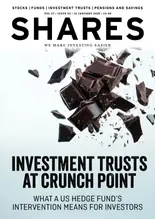
A spike in oil prices was lending support to the FTSE 100 at midday Tuesday, but the overall market lacked impetus, amid concerns about the UK and global economy.
The FTSE 100 index was up 42.59 points, 0.6%, at 7,419.44. The FTSE 250 was up 21.99 points, 0.1%, at 19,435.34, and the AIM All-Share was down 0.05 of a point at 837.46.
The Cboe UK 100 was up 0.5% at 742.07, the Cboe UK 250 was up 0.4% at 16,750.78, and the Cboe Small Companies was up down 0.2% at 12,955.15.
‘Market sentiment remains toneless for the second trading day of the week as most investors are still struggling to assess the short- to mid-term outlook for risky assets,’ said ActivTrades’ Pierre Veyret.
London’s equities seemed largely unfazed by the latest damning assessment of the UK economy and government policy, as the Organisation for Economic Co-operation & Development predicts the UK will suffer the most from the energy crisis among G7 countries.
The latest forecasts from the OECD reveal a sharp downgrade for the UK economy, which is expected to shrink by 0.4% in 2023 and grow by just 0.2% in 2024. The OECD had predicted in September that UK growth would flatline in 2023.
Germany is the only other G7 country set to see a contraction in gross domestic product next year, with a 0.3% drop, according to the report.
The UK is also the third worst-performing nation of all the G20 advanced countries worldwide, with only Russia and Sweden seeing a bigger decline in GDP, at 5.6% and 0.6%.
The OECD also warned global growth is set to slow from 3.1% this year to 2.2% next year, before rebounding to 2.7% in 2024. Amid the effects of Russia’s war in Ukraine, ‘growth has lost momentum, high inflation is proving persistent, confidence has weakened, and uncertainty is high’, the OECD said.
In European equities on Tuesday, the CAC 40 in Paris was down 0.1%, while the DAX 40 in Frankfurt was up 0.1%.
Saudi Arabia on Monday denied a report that oil producers were discussing a production increase for their next meeting, saying a cut approved last month would stay in place until the end of 2023.
The Wall Street Journal reported earlier on Monday that Saudi Arabia, which co-leads the OPEC+ cartel along with Russia, and other members were considering an ‘increase of up to 500,000 barrels a day’.
But the official Saudi Press Agency said on Monday night that energy minister Prince Abdulaziz bin Salman ‘categorically denies’ the report.
Oil prices firmed following the denial, with Brent oil spiking to $87.89 a barrel midday Tuesday from $83.07 at the London equities close on Monday.
FTSE 100 oil producers Harbour Energy, BP and Shell were up 5.8%, 5.2% and 3.0% respectively.
‘Oil prices are still quite far off from their recent highs, and it seems like the upside potential is being limited by a general sense of uncertainty brought by China’s unclear demand prospects while also being impacted by the ongoing Russia-Ukraine conflict,’ said XTB’s Walid Koudmani.
Anti-virus controls that are confining millions of Chinese families to their homes and closing shops and offices are spurring fears of further damage to already weak global business and trade.
The ruling Communist Party promised on November 11 to reduce disruption from its ‘zero-Covid’ strategy by making controls more flexible, but the latest wave of outbreaks is challenging that, prompting major cities including Beijing to close off populous districts, shut stores and offices and order factories to isolate their workforces from outside contact.
Despite the prospect of reduced demand, London’s mining stocks regained ground from Monday, with Anglo American up 1.9% and Rio Tinto up 1.8%.
‘Metal producers bounced back after yesterday’s slump caused by a new Covid outbreak in China, which caused investors to worry that would translate into reduced commodities demand. That concern is still valid and markets will be closely watching how China deals with this latest flare-up in Covid,’ said AJ Bell’s Russ Mould.
The pound was quoted at $1.1872 around midday in London on Tuesday, up from $1.1794 at the equities close on Monday. The euro stood at $1.0289, up from $1.0236. Against the yen, the dollar was trading at JP¥141.26, down from JP¥141.96.
ActivTrades’ Ricardo Evangelista noted that China’s return to the ‘dreaded’ Covid zero policy is likely to weigh on the growth prospects of the global economy. This could create scope for gains in the dollar, as investors become more risk-averse, he maintained.
Back in the FTSE 100, Severn Trent shed 1.2%.
The Coventry, England-based water utility said it recorded a pretax profit in the six months that ended September 30 of £104.7 million, down 29% from £146.9 million a year ago. However, Severn Trent did swing to a post-tax profit of £78.8 million from a £180.0 million loss.
Turnover rose 11% to £1.06 billion from £958.2 million.
The company declared an interim dividend of 42.73 pence, up 4.6% from 40.86 pence.
In the FTSE 250, multi-utility provider Telecom Plus added 3.4%.
The firm, which trades at Utility Warehouse, lifted annual guidance after its Utility Warehouse offering enjoyed a bumper first-half on record customer growth due to cost of living pressures.
In the half-year ended September 30, revenue jumped 52% year-on-year to £562.4 million from £371.3 million a year earlier.
Pretax profit surged 46% to £29.1 million from £29.9 million.
‘The failure of energy suppliers such as bulb, ampower, igloo, Hub Energy and many, many more has caused great distress to many householders, but a lot of them have been able to get help from Utility Warehouse,’ AJ Bell’s Russ Mould explained.
‘As a result, the FTSE 250 firm is adding customers at a record pace, hiking its first-half dividend, raising full-year profits guidance and the shares are hitting new all-time highs.’
Shares in online electrical appliance retailer AO World jumped 14%.
AO World guided towards annual adjusted Ebitda at the top end of its £20 million to £30 million range. This comes despite its pretax loss widening to £12 million in the six months that ended September 30 from £4 million a year before.
Revenue fell 17% to £546 million from £661 million.
AO World said its focus on cash and profit has led to ‘solid progress in a tough environment’. It also noted that the cash costs of closing its German business are expected to be ‘around zero’ compared to an original estimate of £15 million.
‘AO World was a pandemic winner whose fortunes have taken an alarming turn since, but these results hint that the company may have bottomed out and is ready to recover...Though it’s important to note [the expected rise in earnings is] being driven by cost-cutting, rather than any inherent strength in the business,’ AJ Bell’s Mould commented.
Stocks in New York were called slightly higher, with the Dow Jones Industrial Average and S&P 500 index both pointed up 0.2% and the Nasdaq Composite marginally higher.
Still to come in the economic calendar, there is a eurozone consumer confidence reading at 1600 GMT.
Copyright 2022 Alliance News Limited. All Rights Reserved.




